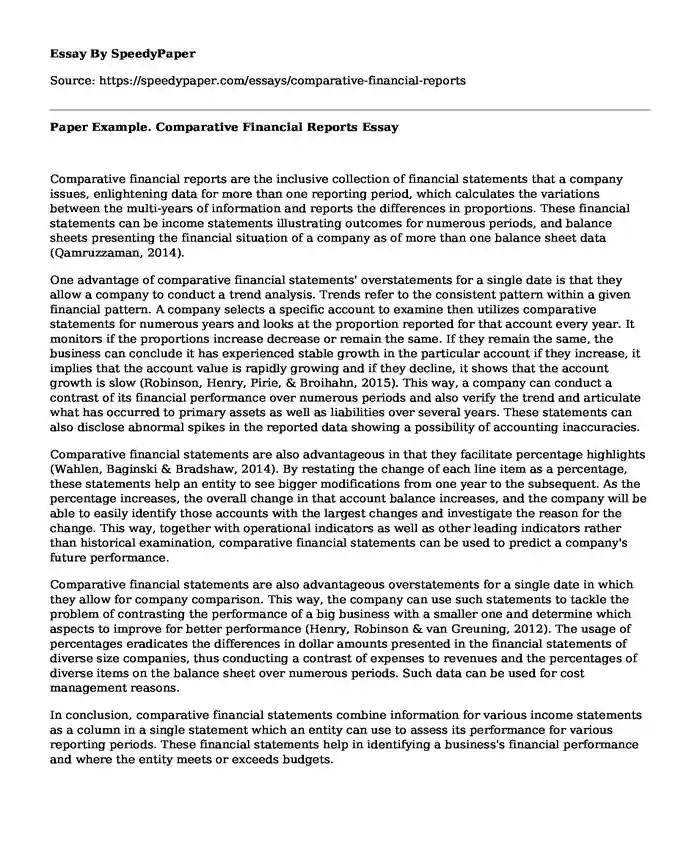
| Type of paper: | Essay |
| Categories: | Audit Budgeting Financial management |
| Pages: | 3 |
| Wordcount: | 572 words |
Comparative financial reports are the inclusive collection of financial statements that a company issues, enlightening data for more than one reporting period, which calculates the variations between the multi-years of information and reports the differences in proportions. These financial statements can be income statements illustrating outcomes for numerous periods, and balance sheets presenting the financial situation of a company as of more than one balance sheet data (Qamruzzaman, 2014).
One advantage of comparative financial statements' overstatements for a single date is that they allow a company to conduct a trend analysis. Trends refer to the consistent pattern within a given financial pattern. A company selects a specific account to examine then utilizes comparative statements for numerous years and looks at the proportion reported for that account every year. It monitors if the proportions increase decrease or remain the same. If they remain the same, the business can conclude it has experienced stable growth in the particular account if they increase, it implies that the account value is rapidly growing and if they decline, it shows that the account growth is slow (Robinson, Henry, Pirie, & Broihahn, 2015). This way, a company can conduct a contrast of its financial performance over numerous periods and also verify the trend and articulate what has occurred to primary assets as well as liabilities over several years. These statements can also disclose abnormal spikes in the reported data showing a possibility of accounting inaccuracies.
Comparative financial statements are also advantageous in that they facilitate percentage highlights (Wahlen, Baginski & Bradshaw, 2014). By restating the change of each line item as a percentage, these statements help an entity to see bigger modifications from one year to the subsequent. As the percentage increases, the overall change in that account balance increases, and the company will be able to easily identify those accounts with the largest changes and investigate the reason for the change. This way, together with operational indicators as well as other leading indicators rather than historical examination, comparative financial statements can be used to predict a company's future performance.
Comparative financial statements are also advantageous overstatements for a single date in which they allow for company comparison. This way, the company can use such statements to tackle the problem of contrasting the performance of a big business with a smaller one and determine which aspects to improve for better performance (Henry, Robinson & van Greuning, 2012). The usage of percentages eradicates the differences in dollar amounts presented in the financial statements of diverse size companies, thus conducting a contrast of expenses to revenues and the percentages of diverse items on the balance sheet over numerous periods. Such data can be used for cost management reasons.
In conclusion, comparative financial statements combine information for various income statements as a column in a single statement which an entity can use to assess its performance for various reporting periods. These financial statements help in identifying a business's financial performance and where the entity meets or exceeds budgets.
References
Henry, E., Robinson, T. R., & van Greuning, J. H. (2012). Financial analysis techniques. Financial reporting & analysis, 327-385.
Qamruzzaman, M. (2014). Analysis of performance and financial soundness of financial institutions (banks): a comparative study. Research Journal of Finance and Accounting, 5(7), 169-186.
Robinson, T. R., Henry, E., Pirie, W. L., & Broihahn, M. A. (2015). International financial statement analysis. John Wiley & Sons.
Wahlen, J. M., Baginski, S. P., & Bradshaw, M. (2014). Financial reporting, financial statement analysis, and valuation. Nelson Education.
Cite this page
Paper Example. Comparative Financial Reports. (2023, Mar 22). Retrieved from https://speedypaper.com/essays/comparative-financial-reports
Request Removal
If you are the original author of this essay and no longer wish to have it published on the SpeedyPaper website, please click below to request its removal:
- Free Essay: Analysing Resistance to Change in the Oil Industry
- Nurses as lobbyist
- Free Essay Example on Health Information Technology
- Cold War and National Security - Free Essay with the Article Review
- A Reflection Free Essay Describing the Achievement of Goals after Going through the Course
- Essay Sample: Diversity Awareness in Healthcare
- Free Paper Example: Analysis of the Various Organizational Systems
Popular categories




